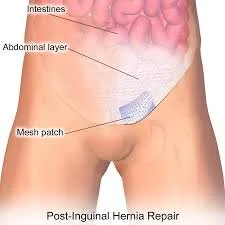Inguinal hernias are a common surgical problem. It is accepted surgical practice to repair these with the use of a prosthetic surgical mesh in order to decrease recurrence. One of the most dreadful complications is infection of the prosthetic material. This normally happens right after the surgery, but late occurrences have been well documented. Non-operative and limited operative treatments are available, however, failure of these modalities mandates definitive operative treatment (i.e., removal of mesh).
Removal of infected mesh is not usually a first-line treatment because it can be a very complicated intervention that carries the possibility of significant tissue damage to the surrounding structures (e.g., nerve damage, testicular loss) and chronic pain, and (because the mesh has been explanted) leaves the hernia defect not fully protected against recurrence. Therefore, non-operative management with antibiotics and drainage is typically a reasonable first treatment. Thereafter, exploration, debridement, incision and drainage, and removal of visibly infected areas/sinus tracts are typically reasonable thereafter. Once these have been exhausted, definitive surgical treatment is required: the mesh must be removed because it is the nidus of an infection that will never be cured without the removal of the mesh.
Inguinal hernias and mesh removal medical expert witness specialties include general surgery, pediatric surgery, pathology, radiology, and prison medicine.

